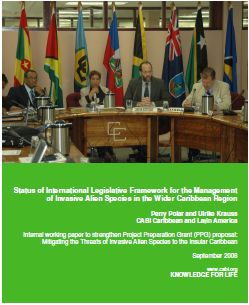 IAS introductions are international in character, hence development of the international legislative framework through global, regional or bilateral agreements is useful to prevent or minimize unwanted introductions and provide mechanisms for control or eradication. Internationally agreed instruments may be binding or non-binding and a range of terms exist to describe the extent to which a state has committed itself to a treaty. A range of international instruments relating to IAS in the context of biological diversity conservation have participation by countries of the Wider Caribbean Region (WCR). This report reviews the range of these international treaties and made the following recommendations to improve the international legislative framework:
IAS introductions are international in character, hence development of the international legislative framework through global, regional or bilateral agreements is useful to prevent or minimize unwanted introductions and provide mechanisms for control or eradication. Internationally agreed instruments may be binding or non-binding and a range of terms exist to describe the extent to which a state has committed itself to a treaty. A range of international instruments relating to IAS in the context of biological diversity conservation have participation by countries of the Wider Caribbean Region (WCR). This report reviews the range of these international treaties and made the following recommendations to improve the international legislative framework:
(1) Individual countries should investigate conventions and organization of which they are not currently parties or members to determine if the benefits of participation are appropriate in their developmental context.
(2) Participation in conventions which control specific marine IAS pathways such as
GloBallast and the Anti-fouling Convention needs to be improved.
(3) In conventions and organization of which there is maximum participation of WCR
members, ad hoc groups such as AOSIS should be established to fine tune mechanisms for the control of IAS pathways through regional or bi-lateral agreements under advice from CISWG.
(4) At COP meetings, WCR countries need to lobby for greater emphasis to be placed
on developing specific mechanisms for the control of IAS beyond general guidelines.
Read full document here:Regional legal regime IAS caribbean Sept 2008